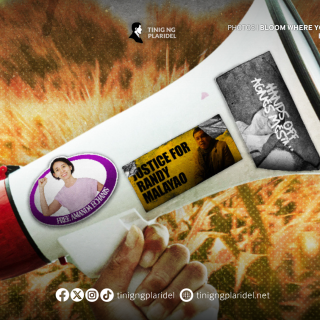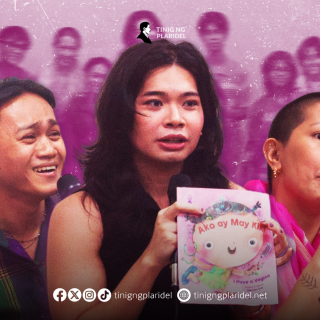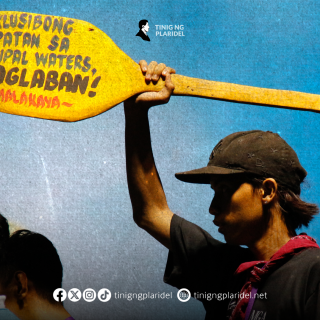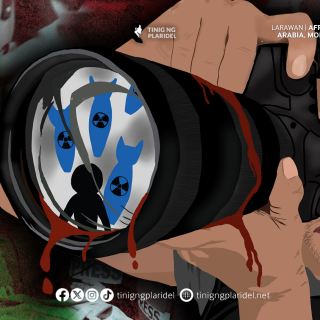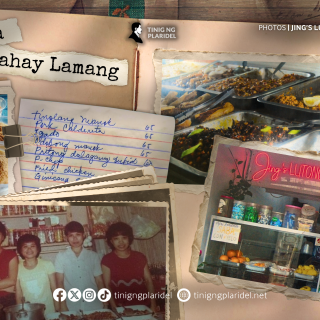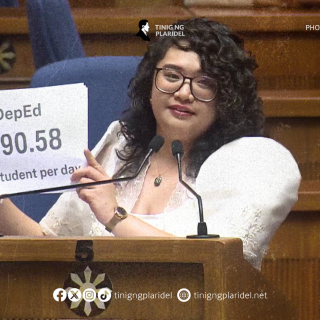When 32-year-old Marvin Rimas stepped out of the airplane on April 24, 2020, he came back to a different Philippines. Instead of the smiling faces of waiting loved ones, Rimas and 44 other returning overseas Filipino workers (OFWs) were greeted by tight lockdown restrictions brought by the COVID-19 pandemic.
Rimas, who used to work as a chef, returned to the country after three months of being stranded and jobless in the United Arab Emirates (UAE). After saving enough money for a P36,000 plane ticket, he packed his bags and took the flight to Manila.
After only eight hours, Rimas and the other OFWs were already back in the Philippines. But because of health protocols, he couldn’t leave the Ninoy Aquino International Airport (NAIA) until 13 hours later.
With airport food stalls closed, returnees starved during the long wait. The batch eventually snacked off the pasalubong meant for loved ones who were waiting for them at home.
“Binigyan lang kami ng isang boteng maliit na tubig [ng airport officials],” Rimas told TNP.
Rimas is among the Department of Labor and Employment’s (DOLE) tally of 809,374 OFWs who were sent home during the COVID-19 pandemic. With more than 1,500 returning every week in 2021, the Department of Foreign Affairs (DFA) reported that the country is experiencing the “largest repatriation of OFWs in [its] history.” Presidential Spokesperson Harry Roque promised “VIP treatment” for the returning workers.
Before the pandemic struck, 2.2 million OFWs were deployed to various countries in 2019. In speeches and policies, government agencies celebrate these workers as the “Bagong Bayani,” whose remittances have accounted for about 10 percent of the country’s Gross Domestic Product since the year 2000.
But Rimas said the sapping sight at the airport is not the homecoming expected of heroes. OFWs like him who were retrenched during the COVID-19 pandemic see little reason to celebrate, not with the poor conditions that their own government made them endure.
Far from a heroes’ welcome
The next day after their arrival, Rimas and his group were sent to their quarantine facility in Parañaque. They were not joined by healthcare personnel, but by military men who escorted them from the airport to the apartelle.
When they arrived, the apartelle management gave them one rule: no posting on social media.
This was only the least of their problems while staying in the facility. While their rooms had air conditioning units and television sets, it did not have food. On the first day of their supposed two-week quarantine, Rimas said they were left to fend for themselves.
“Wala kaming breakfast, wala kaming lunch, so naghanap agad kami ng makakain,” he recalled.
Since the group was barred from leaving the facility even to buy food, Rimas nicked portions of his pasalubong. Little did he know that things would remain this way for almost a month because the national quarantine policy prohibited them from leaving.
“Dumating ‘yung time na wala na kaming pasalubong,” Rimas said.
To leave the facility, the returnees need to test negative for COVID-19. But while the OFWs were told they underwent rapid COVID-19 testing in NAIA, Rimas was concerned that no actual testing took place.
“Kinuhanan kami ng dugo pero wala kaming nakitang rapid test kit,” Rimas recounted.
They were promised that results would arrive in a week. But come 25 days, they still wouldn’t know whether they have COVID-19 or not.
In a television interview, Rimas directly asked Overseas Workers Welfare Administration (OWWA) Administrator Hans Cacdac about the results of their rapid test. But Cacdac gave no definite answer and only cited changes in protocol.
“Hindi namin alam kung totoo ba talagang ginawa ‘yung rapid test sa amin or hindi kasi wala kaming nakuhang resulta ng rapid test,” Rimas said.
After the long wait for their results, the apartelle management told the returnees that they should have been tested with an RT-PCR swab test instead of a rapid test.
With no other option but to abide, the OFWs were tested for COVID-19 through the Philippine Red Cross. When their results were available, they each paid P1,000 to bring a copy to their apartelle.
Two members of the group tested positive.
Because some of the returnees were yet to receive their results, Rimas testified in Congress about the issues inside the quarantine facility. Two days after the hearing, President Rodrigo Duterte announced that the quarantined OFWs should be allowed to return to their families.
Coming home
Employment opportunities in the Philippines are hardly any better, said the International Organization for Migration. In their survey, 83% of OFWs were unable to find a new job three months after staying in the Philippines. Sixty percent of respondents shared a drop in their household income, absent the usual remittances.
To cover his expenses as a returning college student, Rimas coughed up savings to start a small business. But he said this was barely enough for his family.
Rimas added that money is easier to earn overseas than in the Philippines where the average salary is the 95th lowest in 110 countries. Even on his days off in the UAE, he would still accept part-time work to gain extra income.
“We [are] just keeping ourselves busy na lang para hindi ma-homesick,” Rimas said.
For Marc De Jesus, who has been stuck in the Philippines for two years, his job as a clinical administrator gives him little room to sustain rent and school fees for his wife and two children who are studying.
“Kahit anong pagsisikap mo … ang pera talaga hindi ganoong kataas,” he lamented.
De Jesus used to work as an executive secretary to a construction firm in Saudi Arabia. After working for eight years straight with no vacation, he decided to finally return to Rizal province in 2020, with nothing but two packs of clothes and pasalubong to bring home.
While he wanted to go back to the Arabian Gulf after his break, international flight restrictions brought by COVID-19 got in his way. He asked for help from his company to process re-entry requirements, but he couldn’t return because his work Visa expired. Terminated, he is stuck in the Philippines without seven months’ worth of salary and end-of-service benefits.
Aside from financial issues, De Jesus tested positive for COVID-19 in September 2021 and couldn’t work during a three-week quarantine period.
When he was still in Saudi Arabia, he aided other OFWs who were stranded in the country and provided financial aid under his online persona “Kuya Marc.” From experience of repeatedly seeking assistance from the Philippine Overseas Labor Office (POLO) and the Philippine Embassy in Saudi Arabia, he knows OFWs have nowhere to turn to aside from each other.
Agencies such as the OWWA and POLO are mandated to represent OFWs in policymaking, but labor group Migrante Philippines said no government bureau has addressed the demands of Filipino migrant workers.
Migrante is skeptical of the recently passed bill creating the Department of Migrant Workers, which they consider to be a “one-stop-shop” recruitment agency for OFWs.
“Hindi ang pagtatayo ng hiwalay na departamento ang sasagot sa mga problemang kinakaharap ng OFWs kung mananatiling katulad ng sa kasalukuyan ang mga ‘serbisyo’ na hatid nila,” Migrante told TNP.
The labor group sees this development as a creation of a “Department of Labor Export,” which legitimizes the need for Filipino workers to migrate to find greener pastures.
“Maraming mas mahalagang ma-iprayoritisa ang gobyerno – paglikha ng trabahong mag-a-absorb sa mga nawalan ng kabuhayan sa ibang bansa, pag-asiste sa mga OFW na stranded [at] pamamahagi ng ayuda sa nangangailangan,” said Migrante.
Retiring the ‘hero’ narrative
With news censored in Dubai, Rimas only learned about the pandemic when he got hospitalized where the first COVID-19 case in the UAE was detected.
While recovering, Rimas lost his job as his employer did not renew his visa. For three months, he sold face masks, alcohol and quarantine necessities online to make ends meet.
Rimas knew that even if he sought the government’s aid in filing a case, there wouldn’t be any action done. A study by the International Labor Organization found that out of approximately 5,000 cases of OFW abuses that OWWA received last year, only 15% of cases were pursued and 58% reached settlement between the two parties.
But if given another chance to work abroad, even with the horrors he faced, he said “I will take it. I will grab it.”
Meanwhile, it is unlikely that De Jesus would find re-employment in his former workplace. Since his company did not process his Final Exit Visa, he is banned from seeking employment in Saudi Arabia for another five years.
Even if his papers do get processed, he does not see himself returning as an OFW in the near future.
“Napakasarap hong mamuhay dito sa Pilipinas,” he said. “[Pero] ang problema nga lang dito ay ‘yung sistema ng pamamahala.”
For De Jesus, the Philippine government parades its migrant workers as heroes, but the title is a burden more than a distinction.
“Naging busabos kami,” De Jesus said. “Kung hindi din dumating ang pandemya, hindi din namin malalaman [kung ano] ang ginagawa [ng gobyerno].”
Migrante Philippines added that the government continues to romanticize OFWs, all while ignoring the plights they face abroad.
“Hindi sasapat na hirangin kaming bayani sa salita pero kailangan naming manlimos sa panahong kami ang nangangailangan,” Migrante Philippines asserted.



